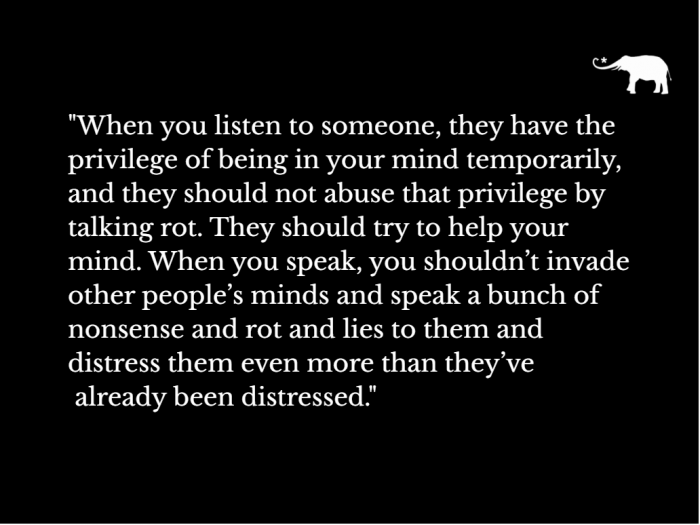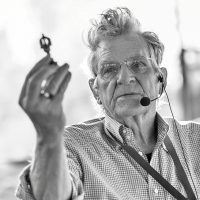~
Watch Waylon Lewis’s interview with Robert Thurman on Walk the Talk Show about his new book, Wisdom Is Bliss by clicking here.
Realistic Speech
The first two branches of the eightfold path, realistic worldview and realistic motivation, constitute the higher education in wisdom. This is the scientific exploration of reality as we experience it, and we transform our experience by understanding it.
To activate the third branch of the path, we move from the super-education in wisdom to the super-education in ethics, which requires us to learn more about how ethics connects to evolution. First of all, we have to acknowledge the evolutionary power of speech, words, and language in order to use them to reshape our lives along with others.
The three path branches constituting the supere-ducation in ethics are:
- Realistic speech
- Realistic evolutionary action
- Realistic livelihood
Why begin with realistic speech? Because good evolutionary actions begin with learning. The realization that actions are evolutionary in their causal impact on oneself and others mandates one’s choice of livelihood.
Ultimately all eight branches of the path must function simultaneously. Their order of presentation emphasizes a best sequence of approach, but they are not rungs on a ladder, where you step off one to get onto another. They are rather like a symphony—you add one instrument at a time until all are playing harmoniously together, and each one comes into its fullest power only when combined with all the others.
Scientists, Politicians, Artists, and Educators
In many discourses, the Buddha describes realistic speech as speaking the truth and avoiding falsehoods; speaking diplomatically, reconciling others’ disagreements and refraining from divisive speech, slander, and backbiting; speaking sweetly and pleasingly, avoiding abusive speech; and speaking meaningfully, avoiding senseless chatter.
None of these four types of realistic speech is fanatical, since one should not use truth to cause harm in certain situations, should not be diplomatic unless it will help the others involved, should not flatter people who are in error or misbehaving just to please them, and should at least withhold meaningful speech in a situation where you know someone will misunderstand. As in all things, pragmatism is essential.
Speaking truth is what scientists are dedicated to doing; they investigate reality and must try to report on what they find, or at least what they consider the truth.
Speaking diplomatically is the focus of peacemakers, those who seek to help others improve their relations with each other, serving humanity in that way. Speaking pleasingly is generally good for one’s own relations with others, and the sweetest speeches are the creations of artists—poets, playwrights, novelists, musicians, bards, and singers. Speaking meaningfully is best for everyone to do, and especially the responsibility of educators, those who help others become more realistic by sharing reality—Dharma—with them, insofar as they have some deeper experience and knowledge of it to share.
Speech Creating Connection
Speech is the particularly human deep way of interconnecting with the minds of others. When you talk and I listen, I open my mind to yours, letting your thoughts direct my attention. When I talk and you listen, you do the same for me. When we read the recorded speech of people from the past, we share their minds, and when future generations read our thoughts, we share with them.
Thus, each of us has the responsibility to be wakeful of what effects we are producing in others’ minds when we speak, and when we listen, we also have the opportunity to enter into others’ experiences of things we cannot experience ourselves.
Speech should be only truthful, it should be only peacemaking, it should be only gentle, and it should be only meaningful. Babbling meaninglessly, or harshly, or untruthfully, or to make people enemies with each other, those kinds of speech are really negative actions. When you listen to someone, they have the privilege of being in your mind temporarily, and they should not abuse that privilege by talking rot. They should try to help your mind. When you speak, you shouldn’t invade other people’s minds and speak a bunch of nonsense and rot and lies to them and distress them even more than they’ve already been distressed. Speech enables us to learn and thereby to evolve, to grow into wiser, more experienced, more realistic, more capable, and happier beings.
Learning new things may even be the essential purpose of all living beings, essential to the quest for true happiness in any one life and along the range of limitless ongoing lives. Human beings, angels, titans, and gods are distinguished by speech. We humans live and evolve in speech, not only physically and mentally in body and mind but spiritually and ethically. Speech has a central role in shaping reality, body being shaped by mind, and mind by speech. Through speech we individual humans can expand our self-identifications to become communal beings without necessarily losing a sense of individual responsibility.
As the great Tsongkhapa said in his enlightenment poem “The Short Essence of Good Eloquence”:
“Of all the buddhas’ many deeds
Their deeds of speech are the supreme,
For this very reason, the wise
Applaud the buddhas for their speech.”
Excerpted with permission from Wisdom Is Bliss: Four Friendly Fun Facts That Can Change Your Life by Robert Thurman (Hay House, Inc.). The book is available everywhere books are sold.












Read 0 comments and reply